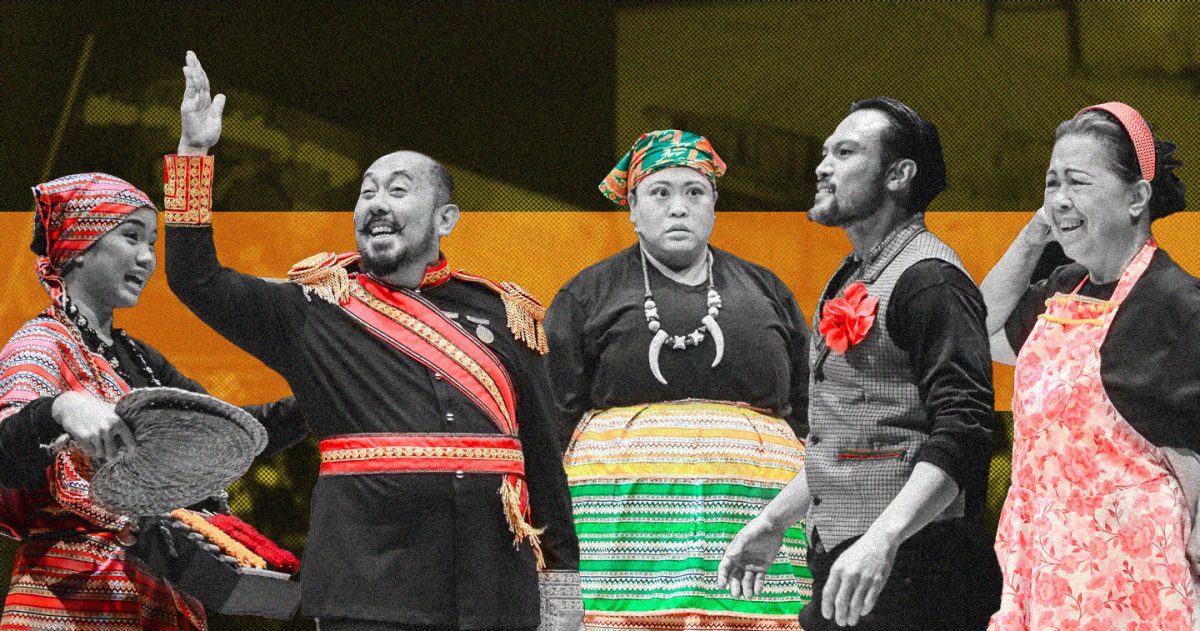MANILA, PHILIPPINES — How does one stand up to an oppressor, especially when it’s oppression created by structural and societal imposition? Dulaang UP‘s Kung Paano Nanalo sa Karera si Rosang Taba shows that and more.
In what is essentially a battle of classes, sizes, and scale, Rosang Taba (Kiki Baento), a servant at the household of Governor-General, stands up to Spanish Commandant Jaime Alonzo Pietrado y Villareal’s (Victor Sy) insults of Filipinos being lazy, uneducated, uncivilized pagans. That Filipinos are “animal-like” is not something Rosa could let pass; she audaciously tells the komandante that she can beat him in a race. What is merely a dismissible challenge for the komandante has high stakes for Rosa because of their standing in society, the honor of her people, and their identity.







Part of the production’s theme is how far does one go in defending something of great importance. Adapted from the Palanca-winning short story for children of Dean Francis Alfar, Kung Paano Nanalo sa Karera si Rosang Taba is fleshed out to contextualize oppression in current times as told through the myth of Lakambini and Matsing: to whom belongs the resources when one is native and another comes to exploit?
The staging is faithful to the source material, yet richly developed each character to suit a new audience; Rosa summons her courage from lessons in her upbringing, support from her peers, and strong belief in herself.
Kiki lends so much of herself to the character of Rosa and it’s no surprise that she was awarded by Leaf Awards as an Outstanding Performer. She encompasses the presence required of her role, notable in her soliloquy when confronted by her parents in the after-scene of the dare. Her nuanced portrayal of an unwavering heroine deserves much credit not just for the exhaustive physicality of the production, but also in substantiating what it meant to be a native muchacha at the setting of the story.







Playing opposite Kiki is Victor, who gives much dynamic to the promise of the race. His ability to play an arrogant Spanish supremacist komandante and be a charismatic character who grips the audience is truly the result of a studied discipline. Rosa’s size is something that he hangs over her head every chance he gets. Despite her human qualities and attributes, he blindly decides that all the colonized are beneath him; thus, underestimating Rosa.
Mark Daniel Dalacat‘s stage design is suited to the Tanghalang Ignacio Gimenez Blackbox Theater, and the ampitheater style of the production leaves not much room for holes, whether in the characterization by the actors or the choices made by technical director Maria Loren Rivera. Functional as it is visually enticing, the production design also captures the contrast in sizes with miniatures moving on an intricate street map that is instrumental to the plot beyond being just the space where the play happens.
Worth mentioning in this production is the influence of TikTok in its comedic approach, with sound queues punctuating every five lines or so, at times to the detriment of driving home the dialogue’s point. The abrupt changes in tone, and line delivery with unnatural and almost absurd choreography, elicit more than it would without these elements. To this effect, the production maximized the presence of the live band: Rosang Tabanda, more than just accompanists but characters in their own right as well.





Consistently referred to as dehado (at a disadvantage) throughout the story, Rosa uses this to ask for two conditions for the race: that she chooses the route, and she gets fifteen steps ahead of her opponent. So how does Rosa defeat the haughty komandante? The answer: through sheer bravery, strategic thinking, and embracing her larger-than-life self.
With applause well-deserved, Dulaang UP’s Kung Paano Nanalo sa Karera si Rosang Taba delivers equal parts entertainment, effective storytelling, and thought-provocation. The production’s strength resides in sharpening the unyielding parts of oneself to be the catalyst in overcoming maltreatment.
Kung Paano Nanalo sa Karera si Rosang Taba is running until May 05 at the IBG-KAL Theater, UP Diliman.








